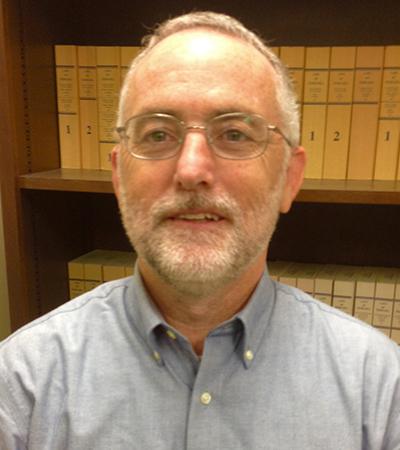
Hotz, '94, Designated Lawrence Lasser 2016 Tax Judge of the Year
14 Sep 2016
Rob Hotz, '94, has been designated the Lawrence Lasser 2016 Tax Judge of the Year by the Lincoln Institute of Land Policy and the National Conference of State Tax Judges. Hotz has served on the Planning Committee of the National Conference of State Tax Judges for each of the last seven years. The Lincoln Institute of Land Policy, based in Cambridge, Massachusetts, is an independent, nonpartisan organization whose mission is to help solve global economic, social, and environmental challenges to improve the quality of life through creative approaches to the use, taxation, and stewardship of land. The National Conference of State Tax Judges meets annually to review recent state tax decisions, consider methods of dealing with complex tax and valuation disputes, and share experiences in case management.
Hotz was reappointed by Governor Pete Ricketts to continue to serve as the First Congressional District Commissioner for the Tax Equalization & Review Commission until January 1, 2022. Hotz graduated from the University of Nebraska College of Law in 1994. He is also a member of the National Association of Administrative Law Judiciary.
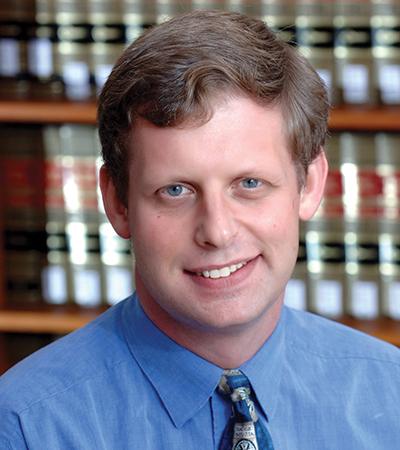
The 2016 Lane Lecture Featuring Professor Eugene Volokh
14 Sep 2016
On Tuesday, September 27th from 12:10-1:15 p.m., the 2016 Lane Lecture will feature Professor Eugene Volokh presenting "Freedom of Speech and Academic Freedom in American Universities".
Are freedom of speech and academic freedom in real danger at modern American universities? What are the legal rules protecting campus speech, and the limits on those rules? This lecture will canvass the subject in detail.
Professor Volokh is the Gary T. Schwartz Distinguished Professor of Law at the UCLA School of Law. Volokh teaches free speech law, tort law, religious freedom law, church-state relations law, and a First Amendment amicus brief clinic at UCLA School of Law, where he has also often taught copyright law, criminal law, and a seminar on firearms regulation policy. Before joining the faculty at UCLA, he clerked for Justice Sandra Day O'Connor on the U.S. Supreme Court and for Judge Alex Kozinski on the U.S. Court of Appeals for the Ninth Circuit.
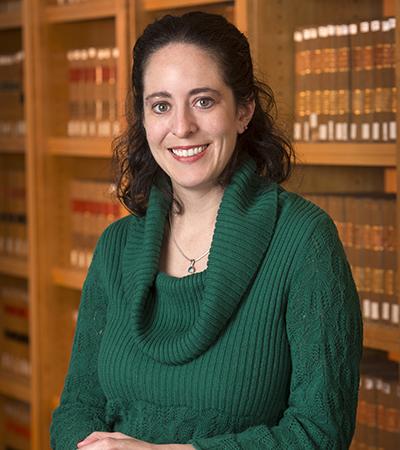
Blankley's Article Published in Creighton Law Review
14 Sep 2016
Associate Professor Kristen Blankley’s article The Ethics and Practice of Drafting Pre-Dispute Resolution Clauses has been published by the Creighton Law Review. This Article is part of a larger symposium on ethics for transactional lawyers. The Article considers lawyers’ ethical duty to advise clients of ADR options even before disputes occur, and the Article gives practical advice on how to draft an effective ADR clause.
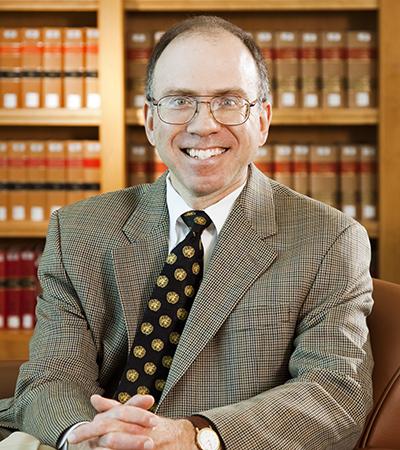
Lepard to Unveil “Universal Declaration of Human Rights by the World’s Religions” in Montreal on September 15
09 Sep 2016
On Thursday, September 15, 2016 Professor Brian Lepard will help unveil a “Universal Declaration of Human Rights by the World’s Religions” at a major conference held at the Palais des Congrès in Montreal, Canada. The conference is entitled “Third Global Conference on World’s Religions After September 11.” The program for the conference, including Professor Lepard’s unveiling of the Universal Declaration, is available online.
Speakers at the conference will include influential experts and activists in the field of world religions and interreligious dialogue, such as Dr. Arvind Sharma of McGill University, who is convening the conference; Deepak Chopra; Sri Sri Ravi Shankar; Dr. Harvey Cox; Dr. Karen Armstrong; Dr. Susannah Heschel; and Dr. Charles Taylor.
The Universal Declaration is intended to complement the United Nations Universal Declaration of Human Rights, adopted in 1948. The objective of the new document is to articulate a common religious perspective on human rights that emphasizes the positive contribution that religions and their followers can make to the full realization of human rights. Nobel Peace Prize laureates His Holiness The Dalai Lama, Archbishop Desmond Tutu, Madam Shirin Ebadi, Bishop Belo of Timor-Leste, and Professor Elie Wiesel are patrons of the project for a Universal Declaration of Human Rights by the World’s Religions.
Professor Lepard assisted in drafting the document, along with many other scholars and religious leaders. He was interviewed last year about the current status of human rights and the world’s religions.
Professor Lepard is the author of numerous books and articles on international law, human rights, world religions, and ethics, including Hope for a Global Ethic: Shared Principles in Religious Scriptures (Bahá’í Publishing, 2005), Customary International Law: A New Theory with Practical Applications (Cambridge University Press, 2010), and Reexamining Customary International Law (Cambridge University Press, forthcoming 2016).
UPDATE:
On Thursday, September 15, 2016 Professor Brian Lepard helped unveil a “Universal Declaration of Human Rights by the World’s Religions” at a major conference held at the Palais des Congrès in Montreal, Canada.
In unveiling the Declaration, Professor Lepard declared before a crowd of about 500 attendees: “This new declaration is proposed not as a replacement for the United Nations Universal Declaration of Human Rights [of 1948], which has played such an important role, but rather as a complement to it. Its purpose is to articulate a common religious perspective on human rights that emphasizes the positive contribution that religions and their followers can make to the full realization of human rights.” A video of the conference presentations, including Professor Lepard’s presentation during the afternoon, can be found here (the introduction to his talk begins at 45:30). The text of Professor Lepard's remarks is also available.
Nobel Peace Prize laureates His Holiness The Dalai Lama, Archbishop Desmond Tutu, Madam Shirin Ebadi, Bishop Belo of Timor-Leste, and Professor Elie Wiesel are all patrons of the project for a Universal Declaration of Human Rights by the World’s Religions, and Madame Ebadi delivered a message to the conference by video.

From left to right: Professor Brian Lepard, Dr. Daniel Cere, Dr. Arvind Sharma, Dr. Vivian-Lee Nyitray, and Dr. Amir Hussain, principal drafters of the Universal Declaration of Human Rights by the World’s Religions
Professor Lepard assisted in drafting the document, along with many other scholars and religious leaders. While in Montreal, he was interviewed about the document by Montreal radio station Radio Ville Marie in French as part of an hour-long program on the conference. During the interview, Professor Lepard discussed the significance of September 11, 2001 in regard to religions and human rights, why a Universal Declaration of Human Rights by the World’s Religions is necessary and relevant, and some of the unique features of the declaration that distinguish it from the United Nations Universal Declaration of Human Rights. A recording of the program, which was broadcast on September 25, can be found here.


Nebraska Law Community Participates in Lincoln Paint-a-Thon
25 Aug 2016
On Saturday, August 20, 2016, Nebraska Law students, faculty, and staff helped paint four houses for disabled and/or low-income elderly Lincoln residents as part of the Lincoln Paint-a-Thon. In total, fifteen professors, nine administrators, three staff members and over 100 students participated in the event.
BuildUP Nebraska, a local non-profit organization and Nebraska Law Entrepreneurship Clinic client, presented the Lincoln Paint-a-Thon.
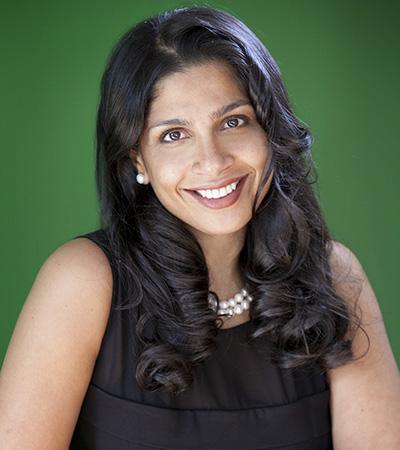
The Gradwohl Family Build Your Character Program on Cultural Competency Featuring Dr. Arin Reeves
22 Aug 2016
On Wednesday, September 7th from 12:10-1:00 p.m., the Gradwohl Family Build Your Character Program on Cultural Competency will feature Dr. Arin Reeves presenting "The Next IQ". Dr. Reeves is a leading researcher, author, and advisor in the fields of leadership and inclusion. Her book, "The Next IQ: The Next Generation of Intelligence for 21st Century Leaders", focuses on inclusion, unconscious biases, and bias interrupters and was a best-seller upon its release in January 2012. She has been featured on NPR for her work and is cited often in online and traditional media as an expert in her field.
Following the lecture, Dr. Reeves will facilitate "The Next Step", a workshop to further the understanding of "The Next IQ".
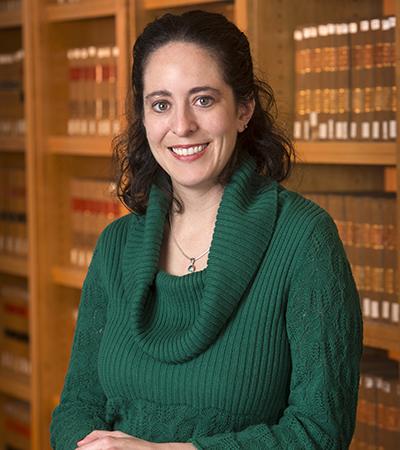
Blankley's Article Accepted by Gonzaga Law Review
16 Aug 2016
Associate Professor Kristen Blankley’s Article, Is A Mediator Like A Bus? How Legal Ethics May Inform The Question of Case Discrimination by Mediators, has been accepted for publication in the Gonzaga Law Review. This Article grapples with the important question of whether mediators can decline appointments on the ethical basis of bias even when the basis for refusing the work is based on a protected classification.
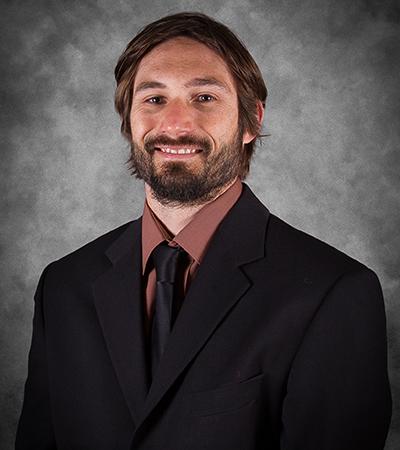
Bray '16, Published by ABA Forum on Construction Law
11 Aug 2016
Nathaniel Bray, '16, was named a finalist in the 2015 ABA Forum on Construction Law Student Writing Competition for his article Project Counsel in an Online Construction Industry. The full article as featured in the Forum's Summer 2016 newsletter.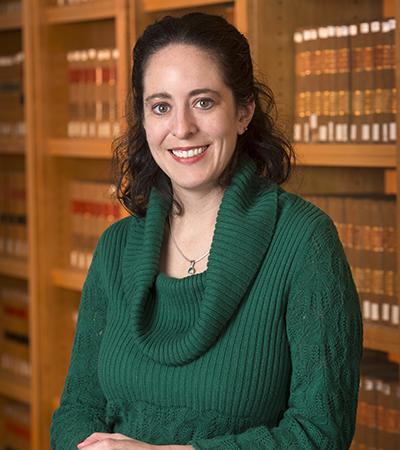
Blankley Appointed to Council for the American Bar Association Section of Dispute Resolution
09 Aug 2016
Kristen Blankley has been appointed to serve on the Council for the American Bar Association Section of Dispute Resolution. Being appointed as a Council Member is an honor, and Professor Blankley is looking forward to her new leadership role in the Section of Dispute Resolution. In addition to this position, she will continue to serve as co-chair of the Ethics Subcommittee.
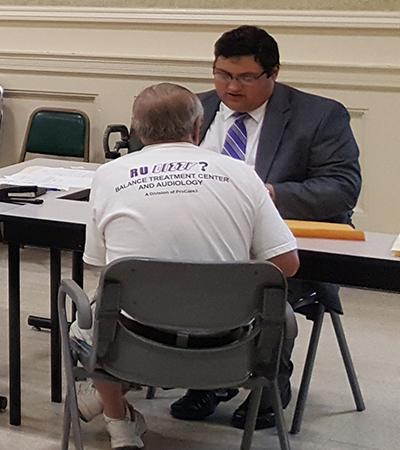
Civil Clinic Students Host 2nd Annual "Wills for Heroes" Event
30 Jul 2016
On July 29, 2016, the Civil Clinic held its second annual “Wills for Heroes” event at the VA Hospital in Lincoln. Civil Clinic students Dan Christiansen, Bryan Gelecki, Amara Meyer, Jerad Murphy and Eric Synowicki provided advice and drafted basic estate planning documents for local veterans. In its initial run in 2015, Professors Ryan Sullivan and Kevin Ruser, and three students served 14 veterans and their spouses. Due to an increase in demand, this year’s program was expanded to five students who served 22 veterans and their spouses, drafting 76 estate planning documents. Veterans who were unable to get an appointment for the event were put on a list and will be assigned to Civil Clinic student teams in the Fall and Spring semesters.
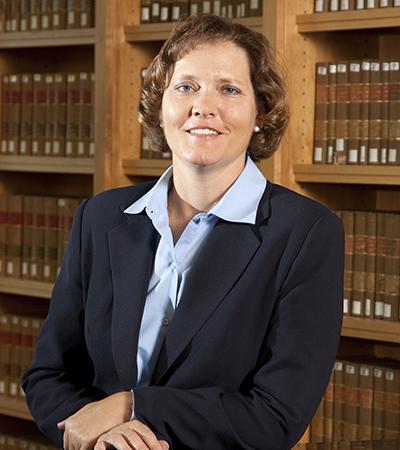
Medill Featured in Experiential Learning Summit
25 Jul 2016
Professor Colleen Medill was a featured presenter at the Experiential Innovation Summit: Incorporating Skills Throughout the Law School Curriculum, an invitation-only conference sponsored by West Academic Publishing held July 18-20 at West ’s corporate headquarters in St. Paul, Minnesota. The purpose of the Summit was to gather together law school faculty who are nationally recognized leaders in experiential learning for three days of presentations, brain-storming, and informal conversations on the latest trends in curriculum reform and professional skills training for law students. Professor Medill’s presentation focused on overcoming the perceived obstacles to incorporating legal skills exercises in large section doctrinal courses. Her presentation explained various techniques that can be used to assess student performance on negotiation, drafting, and client counseling skills exercises for first year law students. Professor Medill is the creator and series editor for West’s Developing Professional Skills book series, and the author of Developing Professional Skills: Property, which she uses to teach professional skills in her first year Property course.
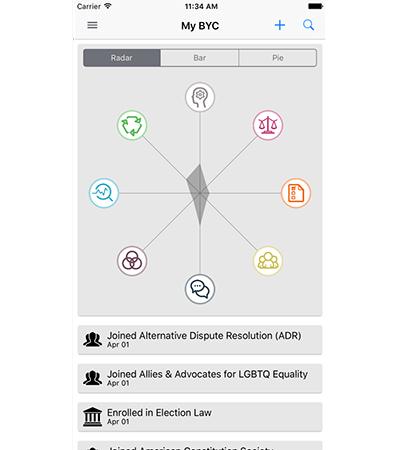
Nebraska Law Launching Build Your Character Mobile App in August
25 Jul 2016
In Fall 2015, the College of Law began working with a Design Studio team at the Jeffrey S. Raikes School of Computer Science and Management. The team of seven students developed a mobile application to help College of Law students organize and record their participation in various BYC activities.
Read more about the Build Your Character mobile app in this National Jurist article.
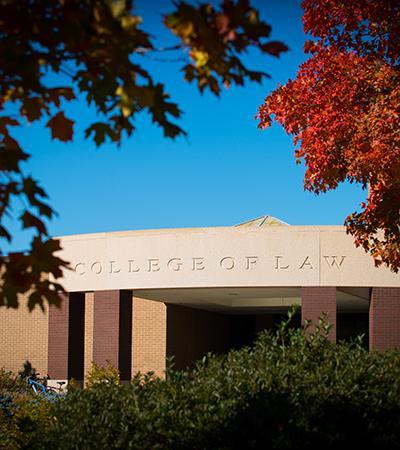
Nebraska Law Named #4 Lowest Debt Law School
25 Jul 2016
The University of Nebraska College of Law has once again been named one of the top 10 law schools with the lowest debt according to U.S. News and World Report. Nebraska Law comes in at #4 with an average debt load of $58,744 for the class of 2015, which is nearly half of the average debt for the class of 2015 nationwide.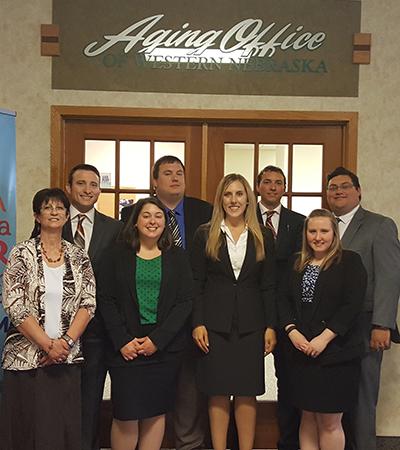
Civil Clinic Students Travel to Scottsbluff for Advance Directive Clinic
20 Jul 2016
On July 20, 2016, Civil Clinic students Jerad Murphy, Dan Christensen, Bryan Gelecki, Leslie Remus and Amara Meyer set off on a 3-day trip to Scottsbluff to facilitate an Advance Directive Clinic (ADC) for seniors citizens in the Panhandle area. As part of the project, these Clinic students prepared 95 estate planning documents and served 30 clients. The Clinic has facilitated these Advance Directive Clinics for seniors throughout Nebraska since the fall of 2013. The project is a collaboration with the Nebraska Department of Health and Human Services and Legal Aid. Since the inception of the project, Civil Clinic students have drafted over 900 estate planning documents for over 200 clients in the following locations: Beatrice, Bellevue, Columbus, Cozad, Fremont, Hastings, North Platte, Omaha, and Scottsbluff. This fall, Civil Clinic students will travel to McCook for another ADC.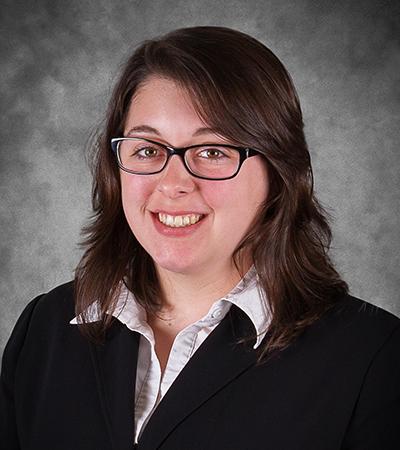
Lierz Named Civil Clinic Student of the Year
20 Jul 2016
Alex Lierz, '16, was chosen to receive the Outstanding Civil Clinic Student of the Year Award for the 2015-2016 academic year. In the letter announcing the Award, Professors Kevin Ruser and Ryan Sullivan detailed the reasons for Ms. Lierz being selected, which included her demonstrated excellence in the fundamental skills all lawyers must possess: problem solving, legal analysis and reasoning, legal research, factual investigation, communication, counseling, negotiation, litigation, organization and management of legal work, and recognition and resolution of ethical dilemmas. In addition, Ms. Lierz’ work on behalf of her clients exhibited the professional values central to the practice of law: provision of competent representation, professional self-development, and a striving to promote justice, fairness and morality and to improve the legal profession. Ms. Lierz’ name will be inscribed on a plaque that lists the names of all previous Civil Clinic students who have received this award.
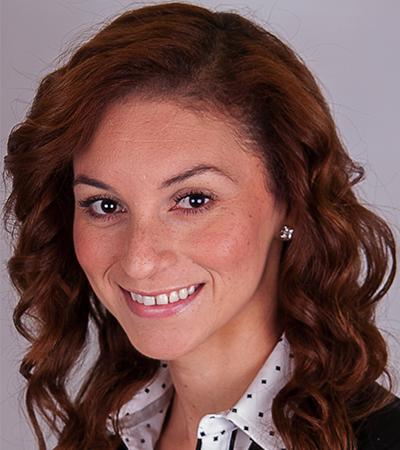
Cortes Receives Pat Gies Award
20 Jul 2016
Roxana Cortes, '16, was selected by the Civil Clinic staff and faculty to receive the Pat Gies Memorial Award for the 2015-2016 academic year. The Pat Gies Memorial Award is given annually to a Civil Clinic or Immigration Clinic student who exemplifies the personal and professional attributes of Pat Gies, a former staff person in the Civil Clinic. The Award states the criteria for selection:
Pat Gies worked as a part-time secretary in the Civil Clinic from August, 2000 until her death in March, 2002. Although she was only in the Clinic a short time, Pat left an indelible impression on those with whom she worked. Her professional and personal attributes were an inspiration to all who knew her. Pat was an accomplished and dedicated co-worker. But she was much more than that. At a time when the legal profession bemoans the lack of civility, Pat exemplified it. In a setting where friends can be elusive, Pat was a friend to everyone. In a world too often lacking in kindness, Pat was consistently and genuinely kind. This award is established to honor Pat’s memory by selecting a Civil Clinic student each year who personifies the virtues Pat brought to her work and to her life: those of professional excellence, civility, collegiality and kindness.
Ms. Cortes’ name will be inscribed on a plaque to be kept in the Clinic offices, which lists all past award winners.
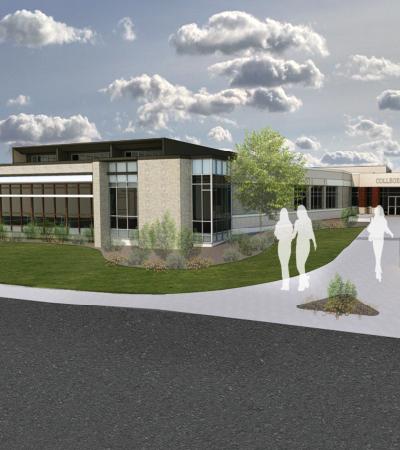
Clinic Construction on Schedule
20 Jul 2016
Construction of the new wing that will house the Civil, Entrepreneurship, and Immigration Clinics continues. At the present time, it is anticipated that construction will be completed in mid to late November, 2016. The Clinics will move into the new wing in time to begin classes for the spring semester of 2017. Since 1983, the Civil and Immigration Clinics have been housed in the Welpton Courtroom building. The new Clinic space will allow the Civil, Entrepreneurship, and Immigration Clinics to operate out of one space, and will provide updated facilities out of which the Clinics will operate. Follow the construction progress.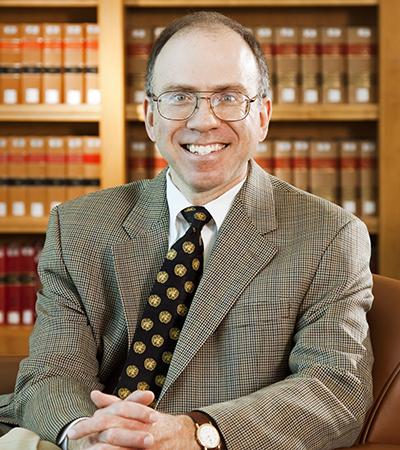
Lepard Named Recipient of the Binning Award for Excellence
18 Jul 2016
Professor Brian Lepard is the 2015-16 Recipient of the John H. Binning Award for Excellence. This award is provided annually to a professor who excels in teaching, research or public service. This year, Professor Lepard published two book chapters, a book review, updates for a tax book, and completed the manuscript for an edited book with the Cambridge University Press. As impressive as his productivity is his breadth as a scholar in that he writes expansively about human rights, tax law, comparative religion, and Baha'i principles and the law. Professor Lepard also put a great deal of effort into his teaching this year by adding skills exercises and providing individualized feedback in all of his classes, even to his class of one hundred 1L students in International Perspectives. Professor Lepard also serves as the Director of the LL.M. in Global Legal Practice Program, which he is working hard to grow and develop.
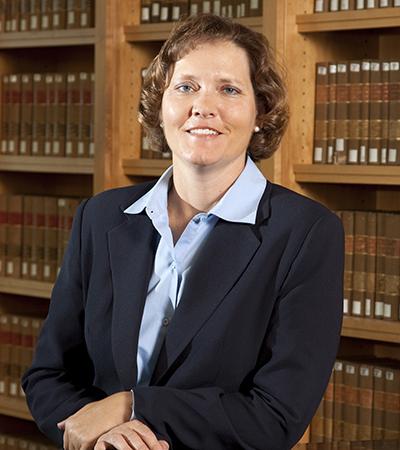
Medill Named Recipient of the Bunger Memorial Award for Excellence
18 Jul 2016
Professor Colleen Medill is the 2015-16 Recipient of the Ray H. Bunger Memorial Award for Excellence. This Award is an annual award chosen on the basis of demonstrated excellence in teaching, research, academic promise, and achievement related to the fulfillment of the research and teaching mission of the University of Nebraska College of Law. The donor for this award gave this gift to commemorate the life of the donor’s father, Ray H. Bunger, who was a lifelong devoted supporter of the University of Nebraska. He sent his three sons to the University of Nebraska for varying periods and several of his grandchildren also received education at the University. He firmly believed that “a good education is something that can never be taken away from you.” He was President of the Franklin County School District #44 and Secretary of the Board of Upland COOP Credit Association.
This past year, Professor Medill placed two articles with highly respected journals, the Iowa Law Review and the peer-reviewed Employee Rights and Employment Policy Journal. She also gave a variety of presentations throughout the region and the country. She is nationally recognized in (at least) three different academic areas – ERISA, Property, and Legal Skills – because of the quality of her written work in each of these areas. And, she is fast developing a fourth – the Affordable Care Act – which will be wonderful for the Law College’s attempts to grow its health care curriculum. Moreover, by all accounts, Professor Medill excels at teaching. Not only is she one of the most popular professors at the law school, but also she is one of the most innovative. Professor Medill's nationally-recognized work to bring skills into doctrinal classes has paid dividends for her students as she relentlessly searches for ways to turn them into lawyers. Finally, Professor Medill has engaged the faculty in an important conversation about developing learning outcomes across our curriculum and she has helped put Nebraska Law at the forefront of this national effort.
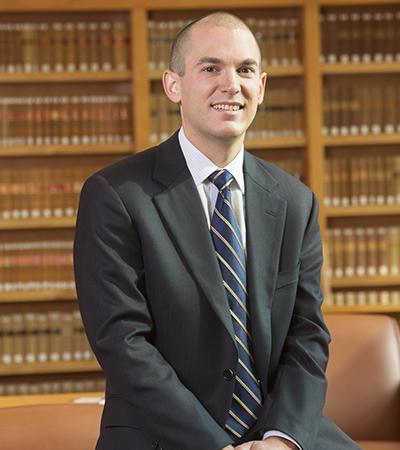
Professor Thimmesch Discusses the Legal Issues Raised by Pokémon Go
14 Jul 2016
Pokémon Go has grown in a short period of time to be a worldwide phenomenon. Over 7 million people in the U.S. alone have downloaded the application, the application has more daily active users than Twitter, and Nintendo stock has surged, adding roughly $7.5 billion to the market value of the company. The game’s popularity is staggering, but follows the incredible success of other applications like Angry Birds, Clash of Clans, and Fruit Ninja. What makes Pokémon Go different, though, is its use of technology to take players out into the real world. Pokémon Go users do not sit on their couches. (Except those who lazily use incense to draw Pokémon to them.) Instead, they go out into the community seeking out Pokémon, Pokéstops, and Pokémon Gyms. The application uses “augmented reality” to place these attractions in the real world, and is the first mainstream game to use the technology to this degree of success.
It is the augmented reality aspect of Pokémon Go that has caused some significant problems, though. Users have found themselves causing traffic accidents or personal injury. Users have stumbled upon dead bodies and have caused calls to the neighborhood police. Pokémon Go thus not only takes users out into the real world, but it brings real world issues into the gaming world. As with any other new technology, this causes some tension—both with how existing laws apply to that technology and at how the technology might change existing law. So what are the potential legal issues raised by Pokémon Go? There are many, and they range from the very real to the theoretical, and these issues will give legal enthusiasts material to discuss for as long as the augmented-reality craze lasts. The material below introduces some of these issues and questions.
Property, Tort, and Criminal Laws Still Apply. Property owners generally have a right to exclude others from their property, and that doesn’t change if a Pikachu happens to “appear” on their lawn. Gamers who walk onto private property in the quest to “catch ‘em all” can face charges for trespass. Pokémon Go trainers who are driving, riding, or walking and playing are likely incredibly distracted and can cause significant injury to themselves or others. Negligence laws might apply to make individuals liable for any damages that they cause while distracted by the Pokémon Go app. Some are questioning whether the application’s developers could also be held liable for these violations. It is the developer that directs individuals to those locations after all. The bottom line is to think and to be careful. Real world rights and responsibilities still exist within the Pokémon Go universe.
Users whose actions go too far can also face criminal sanctions. Trespass can be a crime, and that should not be taken lightly. Some locations—like UNL’s Memorial Stadium—are providing users with special access for Pokémon hunting, and users should carefully abide by the limitations set forth by the property owners in those situations. The criminal issues could go beyond trespass, of course. Pokémon battles are a part of the game, but real-world tensions could lead to criminal assault or battery. Pokémon users are generally a peaceful group, so it is likely that the more common legal issue that will arise will be violations of the traffic laws. Claiming that you were distracted by a Pokémon alert will not provide a defense.
Augmented-reality gaming like Pokémon Go also has the potential to raise some more interesting theoretical questions. Does a property owner have a right to the Rhyhorn that another collects while trespassing on her land? Can a business bring suit against a developer for the disruption caused by the placement of a digital object on her property? What are the rights of places like the Holocaust Museum to opt out of being included in the game? Can the use of the application be restricted on public property? The use of augmented-reality gaming has the potential to raise these types of questions.
We do not yet know the answers to all of these questions. What we do know is that users have very limited property rights in their Pokémon Go accounts. The terms of service for the application provide that users are provided with only a limited right to their Pokémon. They do not obtain any property rights in those digital assets, and they cannot be sold, transferred, or exchanged for other Pokémon Go assets, for money, for services, or any other consideration. Those limitations apply equally to items purchased in the application. The purchase of items like Pokéballs, incense, lucky eggs, or Pokécoins is only the purchase of a “limited, nontransferable, non-sublicenseable, revocable license” to use those items in the Pokémon Go application. Under the terms of service, users obtain no property rights in those items, and the developer can even cancel, suspend, or terminate your account and has no responsibility to provide a refund for those items. Invest in, and develop, your Pokémon at your own risk!
U.S. Privacy Protections Are Limited. Users who download the Pokémon Go app must give that application a wide range of permissions. Those allow the game’s developer access to potentially significant information regarding your personal habits. That obviously includes the location data generated from the use of GPS while playing the game, but it also might include access to your Gmail and to other sensitive personal information. What users should know is that U.S. privacy laws have largely adopted a notice and consent model, where your rights are determined by contract. That means that a company can essentially collect whatever information it requests, as long as you hit “accept” and download the application. Public pressure is the only recourse that users have, and it appears as though that avenue might have succeeded in causing the developers of Pokémon Go to work on limiting the permissions that the application requires. Nothing legally requires that change though, and future developers may not take a similar approach. Users should carefully monitor applications’ requested permissions to ensure that they are comfortable disclosing the required information. The law is of little help in this regard.
Pokémon Go and Tax Laws. It is often said that taxes are one of the two certainties of life, but how do taxes apply to the Pokémon Go world? While there is no Poké tax collector in the app, the game does have real-world tax implications. To start, the success of the application highlights how new technologies are undermining our traditional tax systems. State revenue systems, for example, are often heavily reliant on sales taxes, which have traditionally applied to sales of tangible personal property and of some services. A customer who purchases a toy Pokéball in a store would generally pay state sales tax on that purchase, but she might not pay that tax if she buys a digital version through the Pokémon Go app. The shift of more commerce to digital assets has already placed additional pressure on outdated state tax systems, and the rise of games like Pokémon Go will only further that stress. Your state might already require sales tax on purchases in Pokémon Go or it might start doing so in order to place digital purchases on an even playing field with purchases of tangible assets.
The rise of business models involving digital assets is also a part of the ability of companies to shift profits offshore and to reduce their U.S. income tax payments. A vendor who sells a physical product in the U.S. likely has a U.S. income-tax obligation on its profits. A sale of a digital asset, though, might produce different tax results. The particular tax result obviously depends on the legal and operating structure of the company, but the basic issue is part of the discussions occurring worldwide about how to modernize global tax systems to avoid the use of tax havens to reduce tax payments.
At a more theoretical level, tax scholars have long wondered whether and how the receipt and use of in-game digital assets should be taxed. This started with games like Second Life and World of Warcraft, but could now come to include games like Pokémon Go. At this point, these discussions have been simply academic, but this might become a bigger issue if applications like Pokémon Go continue to gain popularity and generate revenue. The theoretical issues can be especially interesting when applications use a freemium model where users get applications for free, but can pay for in-app upgrades. Pokémon Go, for example, gives users free Pokémon balls when they start, but also allows users to buy more balls for a price. (Currently $0.99 cents for 20 Pokéballs.) By placing a value on those items, the Pokémon Go developers have given them a market value. Could we see a world where getting free Pokéballs at a Pokéstop is a taxable event? Should we recognize that individual Pokémon trainers are really working for Nintendo by providing them endless streams of data? How should the law treat this new type of labor? These are the types of questions that can be raised by these new business models.
Alternative Dispute Resolution. The popular perception of the American justice system generally involves the use of courts to resolve disputes. That is not quite how things work for most disputes with large companies. The Pokémon Go terms of service expressly provide that most disputes arising out of the application will be handled by arbitration, which is a process where non-judges issue binding decisions in disputes without the use of a trial. Under the Pokémon Go terms of service, claims under $10,000 will be handled by written materials only unless you can convince the arbitrator otherwise. Individuals will not have a right to present their case to a judge, jury, or in person to the arbitrator. Users can opt out of that clause, but they must provide the developers with written notice of that choice within 30 days of downloading the application.
Law Isn’t Everything. It can be easy to think of law as the method by which social groups are governed. The law tells us what we can and cannot do and the sanctions for violating those mandates. Social norms also play a significant role in shaping human behavior, though. A property owner might have a legal right to exclude others from her property, but few quibble with a child retrieving an errant ball from their lawn. We thus might expect that an occasional excursion into your neighbor’s lawn to catch a rare Pokémon might be permitted, but inviting ten friends to join you will cause some conflict. Pokémon Go will provide numerous opportunities for individuals to interact in novel situations, and norms of conduct will undoubtedly arise. What sort of social guidelines will govern Pokémon trades? What about conflicts over limited space at a Pokéstop? Users should pay close attention to the social norms that develop as well as the hard legal rules that are in place. It is often the case that technical legal violations do not cause complaint until some more permissive social norm is violated.
These are just a few of the many legal issues that Pokémon Go and similar games raise. Many of the issues require only straightforward applications of existing law, while others raise interesting policy issues that might become more urgent as the economy continues to shift to this type of recreational activity. The success of Pokémon Go will only create further incentive for developers to create this type of game, and users and the legal system will need to adapt. In the meantime, good luck filling your Pokédex!
 Adam B. Thimmesch is an Assistant Professor of Law at the University of Nebraska College of Law. Professor Thimmesch focuses his research on tax matters and the impact of new technology on existing legal systems. He is only a level four Pokémon trainer, but his kids would prefer that he play more often and start training for future battles.
Adam B. Thimmesch is an Assistant Professor of Law at the University of Nebraska College of Law. Professor Thimmesch focuses his research on tax matters and the impact of new technology on existing legal systems. He is only a level four Pokémon trainer, but his kids would prefer that he play more often and start training for future battles.